There are costly and complicated modifications that yield very little difference to the sound of your guitar, and there are also simple and inexpensive changes you can make that result in a huge difference, such as choosing the best electric guitar strings. For as little as $5 and 20 minutes of your time, you can make a significant change to your guitar’s tone and playability.
In this KillerGuitarRigs Review, we checked out all the best strings for electric guitars across a broad range of categories. There’s a string set in this list to suit pretty much every player, whether a drop tuner, bluesman, jack of all trades, big spender, or simply someone wanting a fresh set of strings on a budget.
This test was designed to look for:
Tuning Stability – Did they stretch quickly and hold tune well?
Playability – How comfortable were the strings over an extended period?
Overall Tone – Did the strings have an impact on the Telecaster’s overall tone?
Read more about our review process.
The Strings:
- Elixir Nanoweb Nickel Plated Steel (All Rounder)
- D’Addario Pure EPN115 Pure Nickel (Blues)
- D’Addario NYXL Light Top Heavy Bottom (Metal)
- Ernie Ball Super Slinky (Budget)
- Fender Hendrix Voodoo Child Bullet End (Strat Style)
- Ernie Ball Paradigm (Long Life)
- Ernie Ball 7 String Slinky Cobalt (7 String)
Individual Reviews
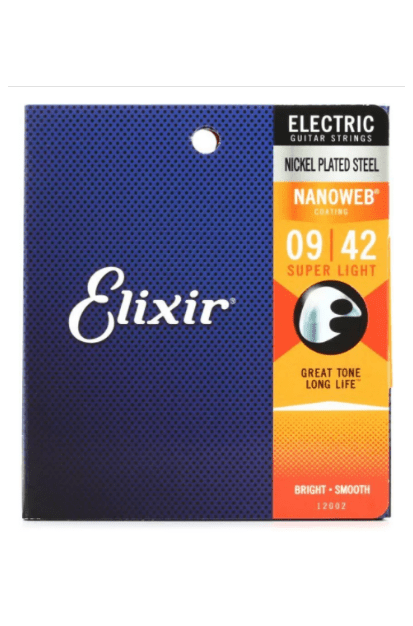
Elixir Nanoweb Nickel Plated Steel
The coating is “barely there” but the results suggest otherwise.
Elixir were early pioneers of coated strings, and these Nanowebs explain why they're still considered some of the best. They offer a great touch, superb response to changes in attack, and a really nicely balanced tone.
Elixir is the go-to brand when it comes to coated strings for electric guitars. There are a few different coatings available in the lineup, but the Nanoweb polymer simply stands out above the rest. These are Elixir’s big sellers and it’s easy to see why.
The polymer coating Elixir applies to these strings is a proprietary blend, and is just 5 microns thick (that’s 5/1000th of 1mm!). By applying such a thin coating, Elixir has been able to produce a product that benefits from the upsides of coated strings, such as smoother feel, reduced noise, and superior lifespan.
We found these strings lived up to, and in many ways exceeded, their reputation. They survived an extended review period, where they saw some heavy-duty use, and actually started to sound better the longer we had them on the test guitar. There was no rust or any other signs of corrosion by the conclusion of the test, from which we deduced that these strings can deal with serious punishment.
Some coated strings scare away guitarists who worry about loss of tone and sustain due to the additional deadening caused by the polymer layer, but there were no such issues with these Elixir Nanowebs. We noted excellent sustain and the tone was bright and punchy across the mids.
Once we had them tuned, that’s where they stayed. These Nanowebs took no time at all to settle and held tune beautifully throughout.
Verdict: Simply put, the Elixir Nanowebs are some of the best strings on the market, no matter the use case. They play beautifully, they’re comfortable, and of course, they don’t begin to deteriorate at anywhere near the same rate as uncoated equivalents. They are well worth the additional cost for the sound and feel alone, but the fact that they outlast their uncoated counterparts by at least a factor of 2 is the icing on the cake.
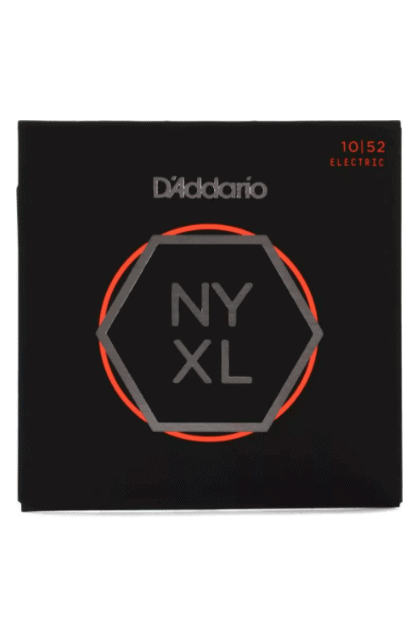
D'Addario NYXL Light Top Heavy Bottom
Incredible performance and even better value.
These strings offer an absurdly long lifespan, and they have the metal tones absolutely nailed. On top of that, the mixed gauges of these strings assist tremendously with alternative tunings, while still providing the type of feel and flexibility you need for lightning fast solos on the upper strings.
Some players immediately reach for the ultra-heavies when they string up for playing metal without even a moment’s thought for a hybrid set. But those who do reach for mixed-gauge strings like these D’Addario NYXLs are treated to guitar strings that can handle heavy strumming, but also remain comfortable and playable enough to manage lightning-fast solos.
We found the tuning stability with these strings was rock solid. Thanks to the heavy bottom end, they held up well on drop tunings, too. Some brands market their strings as being specifically designed with alternative tuning in mind, but strings that aren’t designed as such can still perform well in those conditions!
The feel of these strings is out of this world. There is so little resistance, which makes fast play and finger-tapping styles super easy to play. As far as comfort goes, these strings are up there with the best of them. The light top end helped to reduce tension under the fingers, which made these strings easier to play for extended periods than a typical heavy-gauge metal string.
The tones we got out of these strings were great. Of course, we had a ton of distortion on when playing any metal through them, but note separation remained clear and the midrange punch was huge (check out our full metal string guide for more).
Verdict: The D’Addario NYXLs are a great set of strings if you like to play metal but don’t have an individual guitar solely dedicated to the genre. With these strings, you’ll be able to drop tune at will, or keep things at standard pitch and play pretty much any style. These strings are comfortable, long-lasting, and the flexibility they afford is phenomenal, which made bends and expressive play more enjoyable than we ever expected.
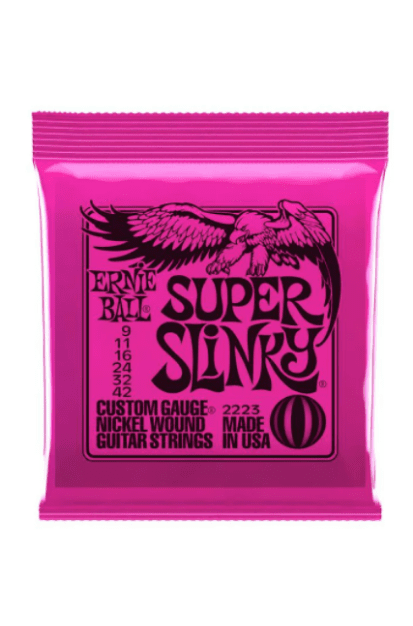
Ernie Ball Super Slinky
Unmistakable pure nickel tones for discerning blues players.
If you're after sparkly highs, and a focused mid range on a tight budget, do as the majority of guitar players do and turn to these EB Super Slinky strings. Consistency between packs is assured, and because of this, you'll be guaranteed to have the same experience every time you restring.
A lot of guitarists have a desire to be individual, to stand out from the crowd. This isn’t always the case when it comes to strings though! Ernie Ball’s Super Slinky strings are some of the most popular electric guitar strings in the world for recording artists and bedroom beginners alike.
At KGR, we love the Super Slinky. You know exactly what you’re getting every time you open a pack, with no unpleasant surprises. We loved the feel of these strings during our test period – they aren’t the smoothest in the world, but they offer plenty of feedback. Super Slinkies are a custom light gauge, measuring in at .009 to .042, which keeps tension low and comfort high.
These strings are made with a steel core and a nickel-plated steel wrap. This kept the tones bright and punchy and goes a long way toward ensuring the universal appeal of the Super Slinky. They played equally well on slow, arpeggiated numbers as they did with fast power chords.
Of course, longevity isn’t as strong with the Super Slinkies as it is with a premium string like the Elixir Nanoweb or the D’Addario NYXL, but the low cost and great tone more than makes up for that. They tune well and hold pitch brilliantly.
Verdict: If you want strings that will sound good in pretty much any guitar, across any genre of music, and won’t cost you an arm and a leg, you can’t go wrong with Ernie Ball Super Slinkies. They hold their tune, the build quality is great, and the value they offer is really incredible.
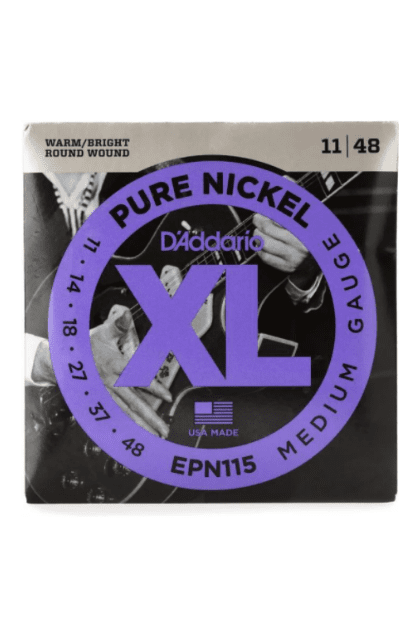
D'Addario Pure EPN1115 Pure Nickel
Mixed gauge strings that bring the chug while remaining flexible.
The pure nickel wrap on these strings results in a warmth that's almost unheard of in a round wound string. They stretch quickly and offer a great feel and a good lifespan.
The vast majority of electric guitar strings are made with nickel-plated steel, so when you compare them to strings made from other materials, they stand out. And this is absolutely the case with these D’Addario Pure Nickel strings.
The entire wrap is 100% nickel, rather than nickel-plated, and the impact on the tone is huge. These were some of the warmest roundwound strings we’ve ever heard. Sustain is one of their strongest points – they rung out for what seemed like forever!
After a couple hours of stretching and settling, these strings held tune really well. Blues requires a lot of expression, including bends and vibrato. Despite the extra workload we put on these strings, they continued to hold pitch.
We tested them in a medium gauge and they play very much true to size. Some players prefer a lighter string for blues to make bends easier, but we found that the tonal benefits of these heavier strings far outweighed the small potential for comfort gains in a lighter option.
The feel was typical of D’Addario strings. Build quality is excellent, there were no rough spots, and the ball ends were very well wrapped, which typically translates to a longer lasting string.
Verdict: The D’Addario Pure Nickel strings are premium strings and the price does reflect that, but if you’re OK with spending a little more than you would on a set of nickel-plated steel strings, you’ll be treated to some of the mellowest on the market. The tone is perfect for BB King style blues, but they can certainly handle other genres, too.
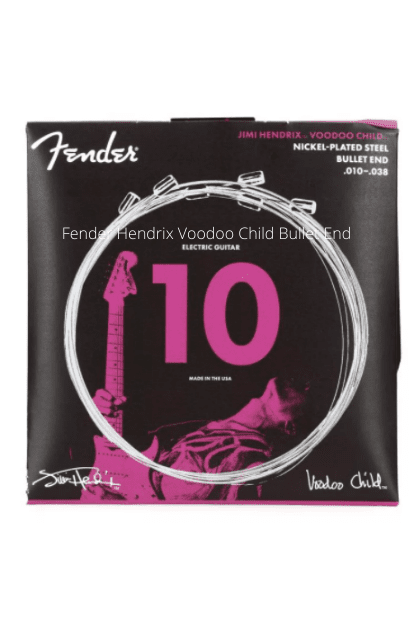
Fender Hendrix Voodoo Child Bullet End
Incredibly tactile strings with an unusual gauge combo.
Smooth play comes with practice, but the right strings definitely help. These mixed gauge bullet end strings from Fender provide a unique feel that some guitarists swear is the key to unlocking the Hendrix-esque tones that so many are looking for
These Fender Hendrix signatures are a faithful replica of the strings Jimi used on his famous Stratocaster. They’re a hybrid set with a twist – they have a medium top and a light bottom. So at the bass end, they measure .038. At the treble side, they come in at .010.
The feel of these strings was unlike anything else we’ve reviewed – on an individual string level, they felt just like any other Fender nickel-plated steel string, but because of the gauge layout, they played like butter. They were smooth across the board and really encouraged expressive play.
Tonally, they were well balanced, although the upper mids really took centerstage with these strings installed. They had the usual nickel-plated steel brightness, and they didn’t lose much of their shine at all during the test period.
Another unusual quirk of these strings was the bullet ends. Instead of the typical ball ends, Fender made these strings with a conical, bullet-shaped anchor. They were designed specifically for guitars with trem blocks, such as the Stratocaster.
Bullet ends have a uniform shape all the way around, so as the strings move in the block during tremolo arm use, they don’t get snagged or twisted. This helps keep them in tune and improves the life of the strings. It’s a really neat invention and we found that it worked really well, as we had no issues with tuning stability, even after some heavy trem use.
Don’t forget to check out our full article on strings for Strats!
Verdict: The Fender Hendrix Signature strings are comfortable, sound great, and hold their tune well. It’s rare to find a set that features so much functional innovation at this price point, so we highly recommend players with Strats and Strat-style guitars give them a try!
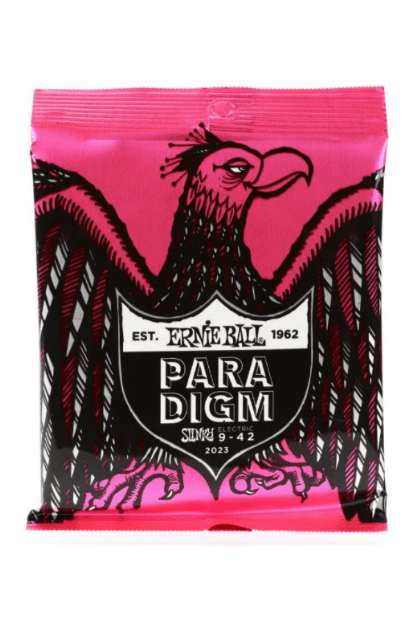
Ernie Ball Paradigm
Extreme performance strings for the most demanding players.
Players who really dislike changing strings absolutely rave about these Ernie Ball Paradigm Strings. They offer a crazy long lifespan, which means extended period between changes, and they sound great for way longer than the average string ever will. Even better, EB even offers a money back guarantee against rust and corrosion!
Ernie Ball have made a lot of strings over the years, but when it comes to strength and longevity, none of them hold a candle to their Paradigm line. These strings were released in 2017, making them one of the newest on the market.
Such is EB’s confidence in these strings, that if they break or rust within 90 days of the original purchase date, they’ll replace them for free. These kinds of guarantees on consumable products like strings are so rare, and it’s great to see a brand standing behind its product in such a way.
We put these strings through an extreme testing regime, including incredibly heavy strumming, huge bends, and outdoor play in the summer heat and humidity. There was absolutely no damage, pitting, or even change in tone – quite amazing.
The strings are constructed from nickel-plated steel and then nano-treated in Ernie Ball’s Everlast polymer coating. We found that they retained all of what we’ve loved about their Slinky series strings, without the loss of sustain you often find with coated strings. The midrange was really strong, with nice bassy undertones, and they worked well for a wide range of music.
As far as feel goes, they were a joy to play. They were smooth, fast, and incredibly comfortable. After installing them and tuning, they settled quickly and were rock solid thereafter.
By the way, click here for our full long-life string guide.
Verdict: If you’ve been searching for a set of long-life strings that don’t come with the usual tone and sustain loss coated strings are known for, you really need to give Ernie Ball Paradigm strings a look. They felt almost impossible to break, but were comfortable and tactile. A rare combination!
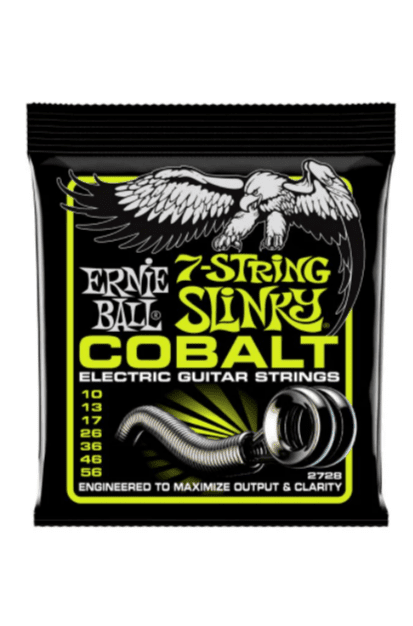
Ernie Ball 7 String Slinky Cobalt
Powerful response and great feel from these innovative strings.
These cobalt strings bring high tech materials to 7 string players, a group that is often left out when it comes to string innovation. They sound great, with huge bass response, a sharp attack and epic tuning stability
Ernie Ball are well regarded for their innovation and drive when it comes to continuous improvement of their products, and their Cobalt Slinky strings for 7-string guitars are a prime example.
They are made with a special iron and cobalt alloy, which is known to be more effective than any other alloy when it comes to magnetic pickup response. After spending some time with these strings, we agree. They offered exceptional clarity and some of the best note separation we’ve ever heard. On a 7-string, this is particularly important.
The tones we got out of these strings were tremendous. We loved the huge bass response and the tight midrange. They’re everything you could want in a 7-string as far as sound goes. Over the test period, there was very little loss of tone, even after playing in some tough conditions. Sustain was strong and the harmonics were sharp.
Tuning these strings was a breeze. We found they were stable across a range of alternative tunings and held pitch well over time. The cobalt in the alloy also helps with corrosion prevention, which goes a long way toward improving the lifespan of these strings.
Despite the extra tension from the additional string, we found these Cobalt Slinkies were flexible and comfortable. They felt good under the fingers and whether we played chords or individual notes, they were tactile and responsive.
BTW, we have a full 7-string strings guide here.
Verdict: It’s always nice to see purpose made 7-string packs that feature the same level of R&D as a company’s standard 6-string sets. Fortunately, Ernie Ball has provided a great set of strings that sound amazing played clean or under heavy distortion. We found no muddiness in the tone, they lasted well, and they were an overall pleasure to play.
How to Choose The Right Strings For You
New players may believe that guitar strings are guitar strings, but as with most gear, there are strings that are purpose-designed for different genres, playing styles, tones, lifespans, etc. Take a look at this guide to learn a little more about what sets strings apart and what to look for in your next set:
Electric Guitar String Gauge
The gauge of your strings refers to their width. Gauge is measured in thousandths of an inch. The smaller the gauge, the narrower the strings.
It’s not unusual to see strings being given a title ranging from extra light to extra heavy, as well as having the gauge printed on the package. This is done to make it easier for newer players to identify which string size is right for them. Do bear in mind that not all manufacturers use the same scale when naming their strings. For example, a packet of 8s (where the narrowest string measures .008”) might be considered an Extra Light by one brand, and Light by another.
The gauge of string you choose affects their use cases in a few ways. Heavier strings are often preferred by metal players, as they’re better able to handle drop tuning. Heavier strings additionally have additional mass, which in turn provides longer vibration, more sustain, and a fatter tone.
Lighter gauge strings are typically used by lead guitarists, blues players, and especially by beginners. They are under less tension, which makes them more comfortable under the fingers. They may lack some of the tone and sustain of a heavy gauge string, but they make up for this in playability, as they’re much easier to bend.
Electric Guitar String Coatings and Treatments
Coated strings have been around since the ’90s, and have undergone serious development over time Early coated strings provided better lifespan than uncoated equivalents, but many lost feel, tone, and sustain in the process.
Now thanks to nanotechnology, string makers are able to put microscopic coatings on their strings that have a minimal impact on how they feel, while still providing full tone and long sustain as well as increased lifespan.
Coated strings are always going to be more expensive than uncoated, but you get strings that play just as well and last 2 to 3 times longer. So spending twice as much doesn’t mean you’re getting half the value if you’d go through 2 to 3 packets of uncoated strings in the same period.
Some brands also use cryogenic treatments to improve string performance. Exposing the strings to extremely cold temperatures causes the molecules of the metal to contract, leaving fewer gaps and improving the consistency of the tone, while also reducing the potential for rust to attack the strings and reduce their lifespan.
Best Electric Guitar String Alloys
The material that your strings are made from, known as the alloy, is the blend of metals used in the production of the strings. The most basic electric guitar strings are typically made from mild steel with a nickel plating applied by electrolysis. The nickel plating provides protection against corrosion while also adding some shimmer to the tone.
Of course, there are numerous metals used in string-making and each has an impact on tone, feel, and lifespan. Tone is affected due to the way in which the metal of the string interacts with the magnetic field generated by the pickups. Different metals have different textures, which will affect the way they feel and react under the fingers. And of course, some metals are inherently corrosion resistant, while others are susceptible to rust.
The lifespan of a string will really depend on the conditions in which it’s being used. Frequency/duration of play, humidity, temperature, and even factors like the chemical composition of your sweat. It is, however, possible to say that some strings will have a short, medium, or long lifespan based on the relative conditions you use them under.
- Nickel-Plated Steel
- The most common material and very inexpensive. Well-rounded tone, with moderate lifespan.
- Stainless Steel
- Moderately-priced strings with an extremely bright tone. They’re inherently resistant to rust and offer a long lifespan.
- Pure Nickel
- Moderately-priced strings with a warm, mellow tone. These strings offer a moderate-to-long lifespan.
- Cobalt
- Cobalt strings are at the more expensive end of the scale. They are bright and articulate with great note separation. The cobalt/iron alloy offers better corrosion resistance than mild steel and gives these a medium-to-long lifespan.
- Titanium
- Titanium strings are amongst the most expensive of all. They are incredibly strong strings with an extreme lifespan even in narrow gauges. Tonally, they’re very bright with incredible tuning stability and intonation.
Electric Guitar String Anchoring Systems
Unless you’re using a Floyd Rose Bridge, your strings will be held in place at the top by the tuning posts, and by way of an anchor near the bridge. The most common anchors are known as ball ends, which are in essence a small eyelet that the string is wrapped around. They’re functional and work well in most applications.
Some manufacturers also make bullet-end strings. These strings have a uniform conical shape, so no matter which way the string is turned, the contact with the guitar is identical. This has benefits for tuning stability, especially on guitars with trem block systems, as there’s no opportunity for this type of anchor to get caught in the wrong position when using the tremolo arm. Also tonally, they offer the most possible contact with the body of the guitar, allowing more of the string vibration to pass through into the wood.
Electric Guitar String Winding
String winding has a huge effect on the tone of your guitar. The vast majority of electric guitar strings are roundwound. This means they use a cylindrical wire to wrap the largest strings. Using a round wire like this makes the strings more flexible, which is very helpful for expressive playing styles, but it introduces more areas for dirt and debris to accumulate, which can quickly deaden the tone.
The other winding style is flatwound. With flatwound strings, a wrap wire that’s been flattened down is used, resulting in a completely smooth-feeling string. They don’t suffer from string squeak and they tend to have a longer lifespan than roundwound strings using the same materials. Their tone is much warmer and softer than roundwound strings, and they’re usually preferred by jazz players.
Final Thoughts
There’s a lot more to choosing the best electric guitar strings than meets the eye. It’s always good to know what style you want to play before committing to a purchase. The choice gets much easier if you have multiple guitars that you can dedicate to different styles. But if you’re limited to one instrument, you’re best off looking for a string that balances a little bit of everything you’d like to play.
Check out these other articles you might like:


